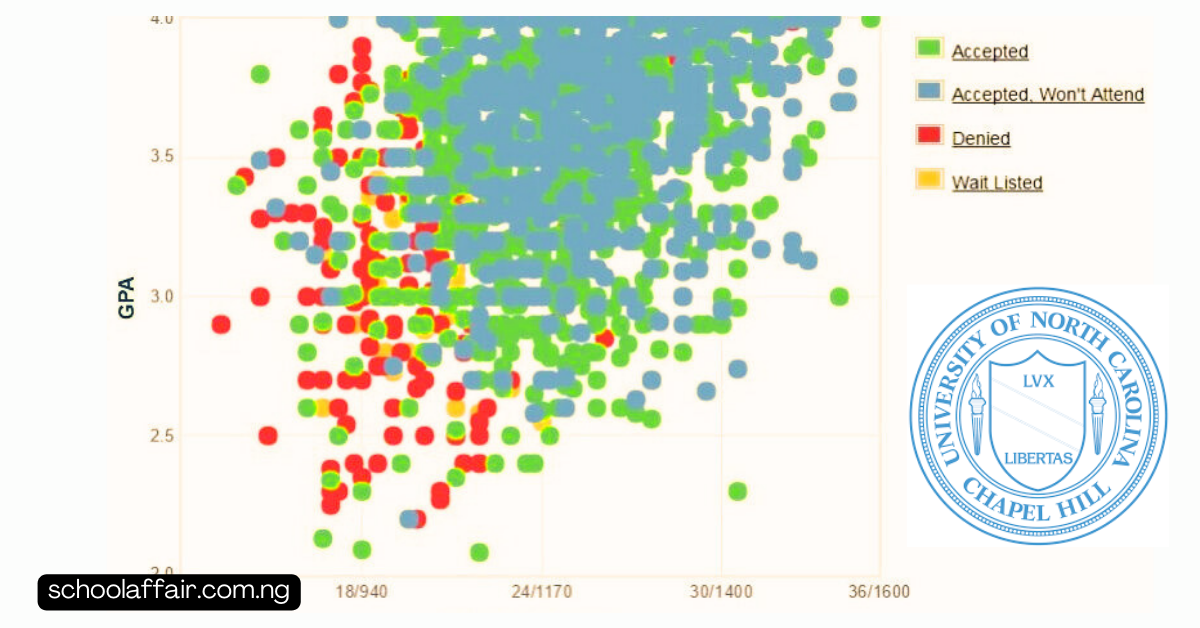The University of North Carolina at Chapel Hill (UNC Chapel Hill) is known for its academic excellence and is esteemed as having one of the best reputations as a public ivy institution. Gaining admission to this university is challenging. In this article guide, we’ll review the acceptance rates at UNC-Chapel Hill, dig deeper into the differences between in-state and out-of-state acceptance rates, and provide the most valuable insights into the admissions process at UNC-Chapel Hill.
UNC-Chapel Hill Acceptance Rates: Overview
UNC-Chapel Hill’s acceptance rate is an important factor for aspiring students to consider. As of the most recent data, the overall acceptance rate stands at approximately 25%.
This means that out of every 100 applications received, only 25 students are granted admission. Such selectivity underscores the competitiveness of the admissions process.
In-state vs. out-of-state acceptance rates
One of the most important distinctions in UNC-Chapel Hill’s acceptance rates is the differentiation between in-state and out-of-state applicants. For in-state students, the acceptance rate is notably higher, at around 43.1% for the Class of 2026. Inside, out-of-state applicants face a much lower acceptance rate of approximately 8.2% for the same class. This difference is mainly due to the university’s commitment to serving the residents of North Carolina.
Factors Influencing Acceptance: GPA and Standardized Tests
While acceptance rates offer a general overview, the admissions process at UNC Chapel Hill is holistic. Several factors are considered when evaluating applicants, including:
- GPA: Applicants are expected to have a strong academic performance. Meeting or exceeding the university’s GPA requirements is very important to being competitive.
- Standardized Test Scores: UNC-Chapel Hill accepts both SAT and ACT scores. For the Class of 2026, the mid-50% SAT score for enrolled freshmen was 1360–1500, while the ACT range was 29–33. Strong test scores can grant your application.
‘Read this: How to Apply for 2023 KPMG Nigeria University Scholarship Programme
Admissions Trends and Demographics
- The university’s top five majors for incoming students include biology, business, psychology and neuroscience, computer science, and political science.
- A huge portion of admitted students plan to study advanced degrees, with 80% of the Class of 2026 expressing this ambition.
- Community service plays a role in admissions, as 74% of incoming students participated in community service during high school.
The Importance of Residency and Recommendations
State residency is part of UNC Chapel Hill’s admissions process. Being a North Carolina resident provides a great advantage, as the university reserves a sub-score percentage of its spots for in-state students due to state regulations.
Recommendation letters also hold weight in the admissions process, along with extracurricular activities, talent, character, and personal qualities.

Conclusion: UNC Chapel Hill
Gaining admission to UNC Chapel Hill is challenging. While acceptance rates are competitive, meeting GPA and average test score requirements is important. In-state students have a higher acceptance rate; that’s the advantage of state residency.
As you plan to apply for the college application journey, remember that UNC Chapel Hill seeks like-minded, motivated, and intellectually important students who will contribute positively to the university community and beyond.
Note: Admissions statistics and policies may change over time, so it’s advisable to refer to the university’s official admissions website for the most up-to-date information.


